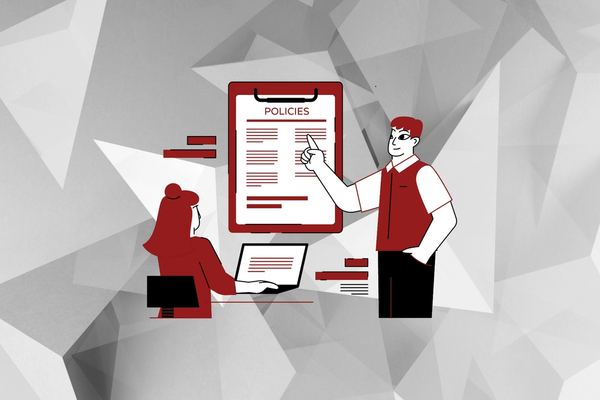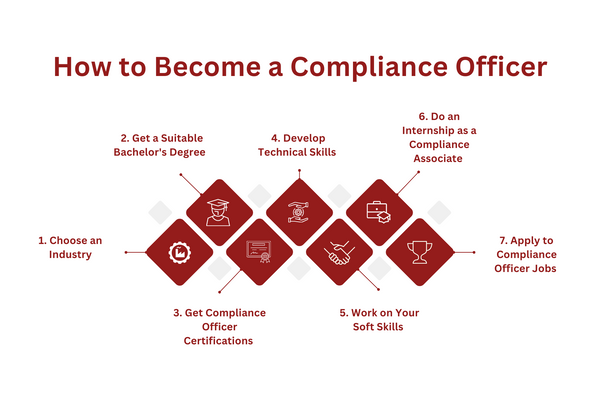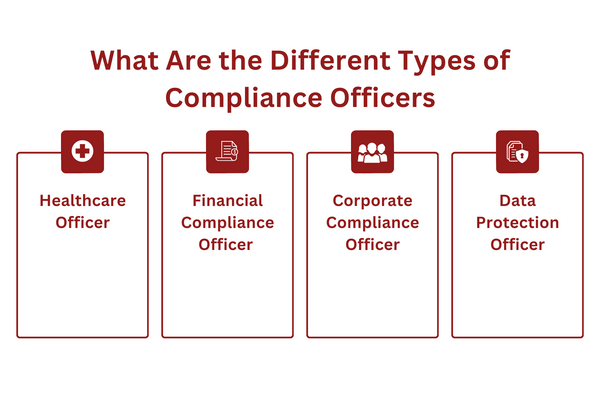
With many industries adopting more stringent regulations, it’s becoming increasingly difficult for businesses to stay compliant, and as a result, compliance officers are in high demand.
Compliance officers ensure businesses stay compliant with legal and internal regulations. If that sounds interesting to you, then in this article, you’ll learn how to become a compliance officer.
The guide will cover the role of compliance officers, the skills and knowledge required to become one, and the potential of a career as a compliance officer.
Let’s dive right in.
What Does a Compliance Officer Do?
What Does a Compliance Officer Do.png

A compliance officer is responsible for ensuring that businesses follow the processes and regulations required by law.
Compliance officers interpret laws and regulations pertaining to industry and help businesses develop internal systems that ensure compliance with these regulations.
As such, the role of a compliance officer is a critical one, especially for businesses that operate in highly regulated industries. By ensuring businesses are compliant with relevant regulations, compliance officers help businesses avoid hefty fines for non-compliance.
They also lay out the framework for designing internal processes that ensure compliance with external regulations. Compliance officers may also be tasked with training employees in the rules and processes required to meet compliance standards.
Depending on the type of business, compliance officers may lead a team of compliance specialists and compliance coordinators to ensure corporate compliance. They may be responsible for compliance audits and risk assessments and will collaborate with management to ensure smooth risk mitigation with regard to compliance issues.
How to Become a Compliance Officer
How to Become a Compliance Officer Steps.png

If you’re looking to kickstart your career as a compliance officer, you’ll need relevant skills and experience. The compliance officer career path is pretty simple, but you’ll need the experience to land a good position.
To become a compliance officer, you’ll need a college degree and a background in strategy, finance, law, or business. You may also need specialized certification based on the industry you operate in.
Here are the steps needed to successfully pursue your career as a compliance officer:
1. Choose an Industry
Compliance officers are needed in many industries, but it’s best to choose an industry that suits your education and experience. As with many other jobs, it pays to become a specialist in an industry and the same goes for working in compliance.
Some industries require more specialized compliance officers, while others can do with general corporate compliance specialists. For example, HIPAA compliance officers may need a medical background or should at least have specialized medical compliance certification.
When choosing an industry as a compliance officer, here are some questions to ask yourself:
Do you prefer working in larger or smaller industries?
Are you willing to complete specialization courses for the particular industry?
What is the scope of compliance in the particular industry? Are compliance officers in demand?
Do you enjoy working in a particular industry?
How lucrative is a compliance officer’s salary in the industry?
Remember, compliance officers are paid more in industries where the industry is at a much higher risk of non-compliance. This means the work pressure is much higher, so make sure you can handle it before applying.
2. Get a Suitable Bachelor’s Degree
While a specialized degree isn’t always required for compliance officers, most businesses require you to have a bachelor’s degree at the very least. A law degree is ideal as it prepares you to work in different industries.
However, you can become a compliance officer with many other bachelor’s degrees, including finance, business, or information technology.
And once you gain some experience and want to move to a senior compliance position, you can always do a master’s degree in a relevant field.
3. Get Compliance Officer Certifications
Depending on the industry you plan to work in, there are many compliance certifications that are highly recommended to complete beforehand. While some businesses make certification mandatory, you’ll do better in job applications with these voluntary compliance certifications.
Common compliance officer certifications include:
Certified Compliance and Ethics Professional Program: This is a general compliance certification that can be helpful regardless of your preferred industry. It’s offered by the Society of Corporate Compliance and Ethics and is an essential certification for many compliance jobs.
American Bankers Association (ABA) Compliance Certification: The ABA offers compliance certification for financial compliance offers. This covers compliance with financial regulations, internal fraud, and similar financial compliance topics.
National Association of Federal Credit Unions Compliance Certification: The NAFCU also offers financial compliance certification for compliance officers. This covers ethics, financial compliance, fraud prevention, and more.
While there are other compliance certifications available, these are usually industry-specific and can help with compliance specialization.
Certification courses are highly recommended because they can help you land better positions, stay updated with compliance requirements, and network with other compliance specialists.
4. Develop Technical Skills
The next step to becoming a compliance officer is to develop the technical skills required for the position. Compliance officers need to have strong research skills, an eye for detail, and know the ins and outs of basic data processing software.
Here are some skills to develop if you want to excel in your career as a compliance officer:
Research Skills: Since regulations are updated regularly, you’ll need to be constantly researching as a compliance officer.
Communication Skills: A major part of your job as a compliance officer is to communicate reports with senior management and government officials. For this, you’ll need to have exceptional verbal and written communication skills.
Problem-Solving: Compliance officers aren’t only responsible for audits; businesses also hire them to fix compliance issues. For this, you’ll need to apply problem solving techniques and have a strategic thinking approach.
Master Data Processing Software: As a compliance officer, you’ll need to be an expert in PowerPoint, excel, and other data processing software tools. Also, learn how to use content management systems, ERP tools, and statistical software.
5. Work on Your Soft Skills
While hard skills are a must to land any compliance job, you’ll need soft skills to grow your compliance career.
These include mastering the art of communicating unpleasant information, navigating corporate politics, and learning how to take a firm stance to achieve certain objectives.
Compliance officers often report directly to senior management, and their audits aren’t always appreciated by other departments. So, if you’re going to be successful in your career as a compliance officer, spend time developing your soft skills as well.
6. Do an Internship as a Compliance Associate
Even if you have the skills and qualifications to land a compliance job, you’ll need experience to become a compliance officer. The easiest way to enter the world of corporate compliance is to do an internship as a compliance associate.
This will give you the experience needed to land your first job and you’ll gain valuable knowledge on compliance procedures during an internship.
7. Apply to Compliance Officer Jobs
Once you have a degree, skills and some experience in the field, it’s time to look for your first job as a compliance officer.
If you’re starting out, you may need to work several years in general corporate compliance or as a compliance associate and compliance specialist before you can land a good position as a specialized compliance officer.
When applying to compliance officer jobs, keep these tips in mind:
Apply at large, well-established firms to gain credibility.
Look for positions that suit your career level, but don’t hesitate to apply to senior positions.
Try to apply in industries relevant to your degree, as it will increase your chances of landing the job.
What Degree Do You Need To Be A Compliance Officer?
What Degree Do You Need To Be A Compliance Officer.png

You don’t need any specific degree to become a compliance officer. However, you will need to have a relevant bachelor’s degree at the very least to apply for compliance officer jobs.
Most businesses prefer candidates with a legal background. If you don’t have a law degree, you should at least be an expert in the industry where you’re applying.
Common degrees for compliance officers include:
Bachelor of business administration
Bachelor in legal studies or criminal justice
Bachelors in finance
Bachelors in information technology
Healthcare degrees
Bachelor in data management, research, or statistics
If you have a law degree, you’ll be able to enter most industries as a compliance officer. However, you’ll still need relevant knowledge of the industry to excel at your job.
What is Before & After Compliance Officer?
What is Before & After Compliance Officer.png

A compliance officer job is a senior position, and compliance officers may be in charge of a complete team of compliance specialists. However, you’ll usually start out as a compliance associate before moving up to compliance officer and then to management.
Initially, you’ll work as a compliance assistant and help compliance specialists with day-to-day tasks. Once you gain some experience, you can start working as a compliance specialist and then move towards becoming a compliance coordinator.
But being a compliance officer is not the end of your career path.
Experienced compliance officers can be promoted to compliance managers, and you may be assigned a team of compliance specialists. The highest position above a compliance officer is a chief compliance officer, who is responsible for the entire compliance system of a business.
What Are the Different Types of Compliance Officers?
What Are the Different Types of Compliance Officers.png

Pursuing a career as a compliance officer can be enjoyable as there are multiple types of compliance officer jobs available. These are usually classified according to industry. Examples include medical compliance officers, financial compliance officers and so on.
Here are the most common types of compliance officers:
Healthcare Officer
Healthcare officers are responsible for ensuring that health and safety standards at businesses are met. Medical officers play a crucial role in the pharmaceutical industry and help develop processes to ensure strict quality control.
Financial Compliance Officer
If you’re good with finance, you can try to pursue a career as a financial compliance officer. This type of compliance officer job involves auditing a business’s financial system, helping with fraud prevention, and ensuring compliance with financial regulations.
Corporate Compliance Officer
A corporate compliance officer helps businesses maintain general compliance requirements in their respective industries. This often involves compliance with labor regulations, corporate laws, and other general regulations.
It’s often the easiest compliance officer job and requires little specialization.
Data Protection Officer
With data regulations becoming stricter than ever, the demand for data protection officers is increasing. Data protection officers are responsible for ensuring compliance with information protection and consumer privacy regulations.
Many large firms will have data protection officers, especially if they deal with consumer data directly.
FAQs
How Do I Become a Compliance Officer?
To become a compliance officer, you’ll need to have a bachelor’s degree, complete compliance certification courses, polish your technical and communication skills and get relevant experience through internships.
What is the Best Degree to Become a Compliance Officer?
The best degree for compliance officers is a law degree. With a law degree, you can work in any industry as a compliance officer without needing too much specialization. However, you can also become a compliance officer without a law degree.
How Much Do Compliance Officers Earn?
Compliance officers are paid well, and the average compliance officer makes around $75,000 annually in the US. how much you earn depends on your experience, the number of people in your team, and the company type.
Is a Compliance Officer’s Job Stressful?
Being a compliance officer can be stressful at times, but it’s generally a peaceful and stable job. However, it carries a lot of responsibility, and compliance officers are responsible for preventing non-compliance fines.
What Qualifications Should a Compliance Officer Have?
There are no compulsory qualifications for a compliance officer. However, businesses prefer compliance officers with additional certifications along with their bachelor’s degrees.
Final Thoughts
Having a compliance officer is a requirement for many businesses – and the demand is only rising. If you’re looking at staying compliant as a business or want to pursue a career in compliance, Captain Compliance has you covered.